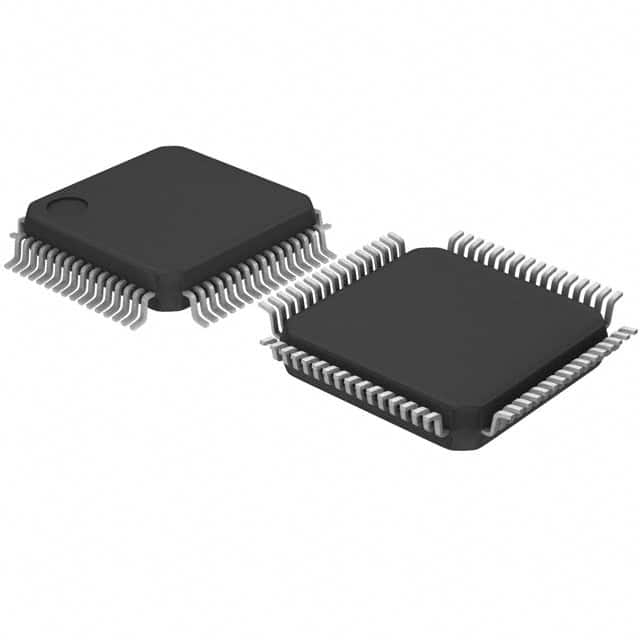MC9S08AC128MFUE
Product Overview
- Category: Microcontroller
- Use: Embedded systems, consumer electronics, industrial automation
- Characteristics: Low power consumption, high performance, integrated peripherals
- Package: 64-pin LQFP
- Essence: 8-bit microcontroller with 128KB flash memory and 8KB RAM
- Packaging/Quantity: Tape and reel, 250 units per reel
Specifications
- Architecture: 8-bit
- Clock Speed: Up to 40 MHz
- Flash Memory: 128KB
- RAM: 8KB
- Operating Voltage: 2.7V to 5.5V
- Operating Temperature: -40°C to +85°C
- Peripherals: UART, SPI, I2C, ADC, PWM, GPIO
Detailed Pin Configuration
The MC9S08AC128MFUE microcontroller has a total of 64 pins. The pin configuration is as follows:
- VDD (Power Supply)
- VSS (Ground)
- PTA0 (General Purpose I/O)
- PTA1 (General Purpose I/O)
- PTA2 (General Purpose I/O)
- PTA3 (General Purpose I/O)
- PTA4 (General Purpose I/O)
- PTA5 (General Purpose I/O)
- PTA6 (General Purpose I/O)
- PTA7 (General Purpose I/O)
- RESET (Reset Input)
- IRQ (Interrupt Request Input)
- PTB0 (General Purpose I/O)
- PTB1 (General Purpose I/O)
- PTB2 (General Purpose I/O)
- PTB3 (General Purpose I/O)
- PTB4 (General Purpose I/O)
- PTB5 (General Purpose I/O)
- PTB6 (General Purpose I/O)
- PTB7 (General Purpose I/O)
- PTC0 (General Purpose I/O)
- PTC1 (General Purpose I/O)
- PTC2 (General Purpose I/O)
- PTC3 (General Purpose I/O)
- PTC4 (General Purpose I/O)
- PTC5 (General Purpose I/O)
- PTC6 (General Purpose I/O)
- PTC7 (General Purpose I/O)
- PTD0 (General Purpose I/O)
- PTD1 (General Purpose I/O)
- PTD2 (General Purpose I/O)
- PTD3 (General Purpose I/O)
- PTD4 (General Purpose I/O)
- PTD5 (General Purpose I/O)
- PTD6 (General Purpose I/O)
- PTD7 (General Purpose I/O)
- PTE0 (General Purpose I/O)
- PTE1 (General Purpose I/O)
- PTE2 (General Purpose I/O)
- PTE3 (General Purpose I/O)
- PTE4 (General Purpose I/O)
- PTE5 (General Purpose I/O)
- PTE6 (General Purpose I/O)
- PTE7 (General Purpose I/O)
- VDDA (Analog Power Supply)
- VREFH (Voltage Reference High)
- VREFL (Voltage Reference Low)
- VSSA (Analog Ground)
- AD0 (Analog Input 0)
- AD1 (Analog Input 1)
- AD2 (Analog Input 2)
- AD3 (Analog Input 3)
- AD4 (Analog Input 4)
- AD5 (Analog Input 5)
- AD6 (Analog Input 6)
- AD7 (Analog Input 7)
- VSS (Ground)
- VDD (Power Supply)
- XTAL (Crystal Oscillator Input)
- EXTAL (Crystal Oscillator Output)
- VCAP (External Capacitor Connection)
- RESET (Reset Output)
- IRQ (Interrupt Request Output)
- BKGD (Background Debug Mode)
Functional Features
- High-performance 8-bit microcontroller
- Integrated flash memory for program storage
- Ample RAM for data processing
- Low power consumption for energy efficiency
- Wide operating voltage range for flexibility
- Various integrated peripherals for versatile applications
- Robust packaging for durability and ease of handling
Advantages and Disadvantages
Advantages
- High performance for demanding applications
- Ample memory for storing complex programs
- Low power consumption extends battery life
- Versatile peripherals enable diverse functionality
- Wide operating voltage range accommod
10个与MC9S08AC128MFUE在技术解决方案中的应用相关的常见问题及解答
Sure! Here are 10 common questions and answers related to the application of MC9S08AC128MFUE in technical solutions:
Q: What is MC9S08AC128MFUE? A: MC9S08AC128MFUE is a microcontroller from NXP Semiconductors, specifically designed for embedded applications.
Q: What are the key features of MC9S08AC128MFUE? A: Some key features include a 8-bit HCS08 CPU core, 128KB flash memory, 4KB RAM, multiple communication interfaces, and various peripherals.
Q: What are the typical applications of MC9S08AC128MFUE? A: MC9S08AC128MFUE is commonly used in industrial control systems, consumer electronics, automotive applications, and home automation.
Q: How can I program MC9S08AC128MFUE? A: You can program MC9S08AC128MFUE using various development tools such as CodeWarrior IDE, IAR Embedded Workbench, or other compatible software.
Q: What programming languages are supported by MC9S08AC128MFUE? A: MC9S08AC128MFUE supports C and assembly language programming.
Q: Can MC9S08AC128MFUE communicate with other devices? A: Yes, MC9S08AC128MFUE has built-in UART, SPI, and I2C interfaces, allowing it to communicate with other devices or peripherals.
Q: Does MC9S08AC128MFUE support analog inputs? A: Yes, MC9S08AC128MFUE has an integrated analog-to-digital converter (ADC) that can be used to read analog signals.
Q: Can MC9S08AC128MFUE control motors or actuators? A: Yes, MC9S08AC128MFUE has pulse-width modulation (PWM) outputs that can be used to control motors or actuators.
Q: Is MC9S08AC128MFUE suitable for low-power applications? A: Yes, MC9S08AC128MFUE has various power-saving features and low-power modes, making it suitable for battery-powered or energy-efficient designs.
Q: Where can I find more information about MC9S08AC128MFUE? A: You can refer to the official documentation, datasheets, application notes, and online forums provided by NXP Semiconductors for more detailed information about MC9S08AC128MFUE.
Please note that the answers provided here are general and may vary depending on specific requirements and use cases.


